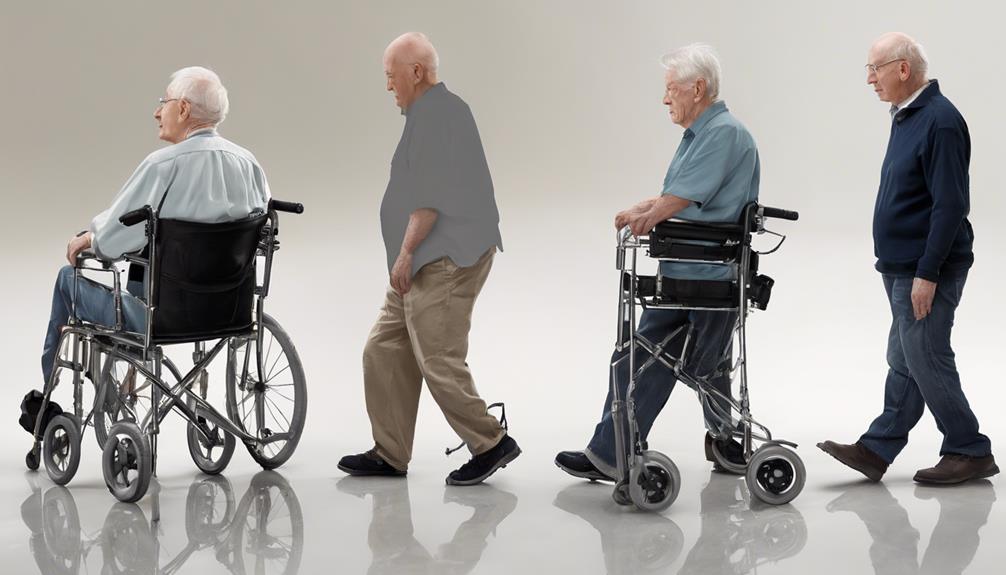In the realm of dementia care, we frequently come to a point where cognitive decline intersects with physical constraints. The responsibility of helping individuals with dementia overcome obstacles related to their mobility is vast and complex.
As we explore the intricacies of this intersection, we uncover the delicate balance required to enhance the lives of those affected by dementia while safeguarding their well-being. Join us in unraveling the strategies and insights crucial for addressing the mobility hurdles faced by individuals with dementia, a journey where knowledge transforms into compassionate action.
Key Takeaways
- Early recognition of mobility changes crucial for tailored care.
- Environmental modifications and bright lighting enhance safety for dementia patients.
- Physical therapy programs and assistive technology aid in mobility improvement.
- Proactive management through effective communication among caregivers and healthcare providers essential.
Understanding Dementia-Related Mobility Changes
Understanding the changes in mobility associated with dementia can provide valuable insights into the challenges individuals with this condition face in their daily lives. Dementia not only affects cognitive abilities but also impacts physical functions, including mobility. Loved ones often notice a decline in their family member's ability to move around the home safely. This may manifest as increased unsteadiness, difficulty coordinating movements, and a higher risk of falls. As caregivers, we must be attuned to these changes to provide the necessary help and support.
The physical changes related to mobility in dementia can be distressing for both the individual experiencing them and their caregivers. Tasks that were once simple, like walking from one room to another, can become daunting. Helping our loved ones navigate these challenges involves creating a safe environment at home, encouraging physical activity to maintain muscle strength, and being vigilant for signs of potential falls. By understanding the specific mobility changes associated with dementia, we can adapt our care strategies to better assist those in need.
Addressing Vision Challenges in Dementia

Navigating the challenges of dementia care involves recognizing how vision difficulties can significantly impact the safety and independence of individuals with this condition. Poor vision can lead to a fear of navigating surroundings, affecting mobility and increasing fall risks. Addressing eyesight problems promptly is crucial to prevent accidents.
Environmental modifications, such as using bright light bulbs, clear signage, and contrasting colors in home décor, can help reduce fall hazards. Regular eye check-ups are essential in managing visual impairment in dementia patients to support optimal mobility. By staying proactive in addressing visual difficulties, caregivers can create a safer environment that promotes independence for individuals with dementia.
It's important to be aware of the impact that poor eyesight can have on daily activities and implement strategies to enhance safety and quality of life for those facing these challenges.
Types of Dementia and Mobility Issues
When considering the challenges individuals face with dementia, various types of this condition can significantly impact mobility due to distinct symptoms associated with each subtype.
Alzheimer's Disease, the most common form of dementia, affects mobility through memory loss, spatial disorientation, and reduced muscle strength.
Vascular dementia, caused by decreased blood flow to the brain, can lead to mobility challenges such as gait disturbances and an increased risk of falls.
Lewy body dementia presents symptoms like muscle stiffness, tremors, and balance issues that affect movement.
Frontotemporal dementia impacts mobility by causing changes in behavior, muscle control, and coordination.
Mixed dementia, a combination of different types, results in complex mobility issues involving a mix of symptoms from various dementia subtypes.
Physical therapists play a crucial role in addressing these mobility issues by working on strength and balance to reduce fall risk and improve overall physical abilities, tailored to the specific challenges each type of dementia presents.
Stages of Dementia and Mobility Changes

As dementia progresses through its various stages, individuals experience distinct changes in mobility that significantly impact their daily lives. In the early stages of dementia, individuals may encounter slight coordination difficulties and balance issues, affecting their ability to move around safely. As the disease advances to the mid-stage, mobility challenges become more pronounced, with individuals facing difficulty walking, an increased risk of falls, and slower movements. Late-stage dementia is marked by severe mobility impairments, including the inability to walk independently, limited mobility, and a heightened risk of falls.
These mobility changes not only affect the individual's physical well-being but also impact their daily activities, making tasks like getting dressed, eating, or using the bathroom more challenging. Understanding the stages of dementia and the associated mobility changes is crucial for providing appropriate care and support to individuals with dementia. Recognizing these changes early on can help caregivers offer the necessary assistance and implement strategies to enhance the individual's quality of life.
Strategies for Managing Mobility in Dementia
To effectively address mobility challenges in individuals with dementia, implementing strategies tailored to their specific needs and capabilities is crucial. When managing mobility in dementia, it's essential to consider the following strategies:
- Physical Therapy: Engaging in tailored physical therapy programs can help improve strength, balance, and coordination, enhancing mobility in individuals with dementia.
- Home Safety: Modifying the home environment to reduce fall hazards and enhance accessibility can significantly improve the safety and mobility of those with dementia.
- Assistive Technology: Utilizing devices like walking aids, GPS trackers, and alarms can support independence and safety in individuals with dementia experiencing mobility impairments.
- Comprehensive Care Plans: Developing holistic care plans that address cognitive alterations, physical limitations, and environmental adaptation can optimize mobility management in dementia.
- Effective Communication: Maintaining open communication between caregivers, healthcare providers, and specialists is essential for creating and implementing proactive management strategies to address mobility challenges effectively.
Frequently Asked Questions
What Are the Mobility Issues With Dementia?
We understand the challenges faced by individuals with dementia when it comes to mobility. Factors such as muscle weakness, cognitive decline, and medication side effects can all contribute to these issues.
It's important to recognize these obstacles and provide the necessary support and care to help improve their quality of life. By addressing mobility problems effectively, we can enhance their overall well-being and comfort.
Do Dementia Patients Do Better at Home or in a Nursing Home?
We find that the decision between caring for dementia patients at home or in a nursing home depends on various factors, such as health status, caregiver availability, safety concerns, financial resources, and needed care quality.
Both settings offer unique benefits; home care allows for personalized routines and family involvement, while nursing homes provide round-the-clock specialized care and structured environments.
Selecting the best option requires careful consideration of individual needs and circumstances.
Where Is the Best Place for a Person With Dementia?
We find that the best place for a person with dementia varies based on their individual needs. Factors like required care level, safety, and personal preferences play a significant role.
Access to medical care, social interactions, and specialized dementia services are also crucial considerations. Consulting with healthcare professionals, social workers, and family can help determine the most suitable living arrangement.
Ultimately, the goal is to provide a secure and supportive environment that meets the unique needs of the individual.
How Long Can a Dementia Patient Be Cared for at Home?
We can provide insight on how long a dementia patient can stay home. It depends on the disease progression and caregiver support network.
Factors such as safety, behavior changes, and caregiver burnout impact this. As the disease advances, care needs increase. Regularly assessing the home environment and the caregiver's capacity is vital.
Transitioning to a care facility may be necessary for the patient's well-being. It's crucial to adapt care as needed.
Conclusion
As caregivers, we understand the importance of addressing mobility challenges in dementia care. By adapting the environment, providing physical therapy, and implementing safety measures, we can improve the quality of life for those with dementia.
For example, Sarah, a caregiver, noticed that her mother with dementia was having trouble walking and implemented a daily exercise routine to improve strength and balance. This simple change made a significant difference in her mother's mobility and overall well-being.
Remember, small steps can lead to big improvements in dementia care.









